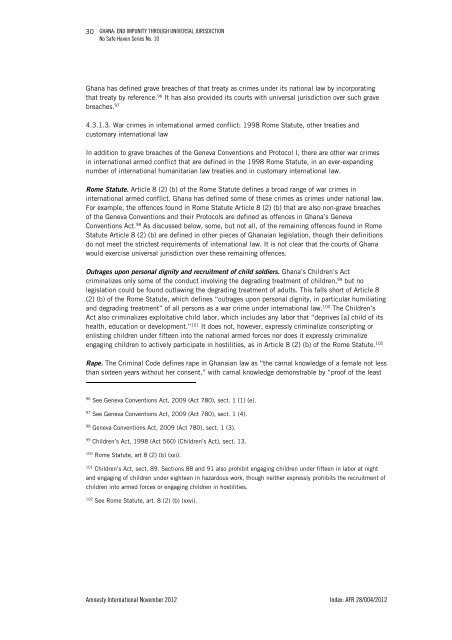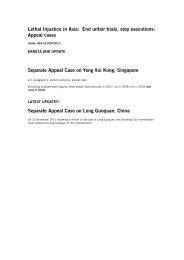30GHANA: END IMPUNITY THROUGH UNIVERSAL JURISDICTIONNo Safe Haven Series No. 10<strong>Ghana</strong> has defined grave breaches of that treaty as crimes under its national law by incorporatingthat treaty by reference. 96 It has also provided its courts with universal jurisdiction over such gravebreaches. 974.3.1.3. War crimes in international armed conflict: 1998 Rome Statute, other treaties andcustomary international lawIn addition to grave breaches of the Geneva Conventions and Protocol I, there are other war crimesin international armed conflict that are defined in the 1998 Rome Statute, in an ever-expandingnumber of international humanitarian law treaties and in customary international law.Rome Statute. Article 8 (2) (b) of the Rome Statute defines a broad range of war crimes ininternational armed conflict. <strong>Ghana</strong> has defined some of these crimes as crimes under national law.For example, the offences found in Rome Statute Article 8 (2) (b) that are also non-grave breachesof the Geneva Conventions and their Protocols are defined as offences in <strong>Ghana</strong>’s GenevaConventions Act. 98 As discussed below, some, but not all, of the remaining offences found in RomeStatute Article 8 (2) (b) are defined in other pieces of <strong>Ghana</strong>ian legislation, though their definitionsdo not meet the strictest requirements of international law. It is not clear that the courts of <strong>Ghana</strong>would exercise universal jurisdiction over these remaining offences.Outrages upon personal dignity and recruitment of child soldiers. <strong>Ghana</strong>’s Children’s Actcriminalizes only some of the conduct involving the degrading treatment of children, 99 but nolegislation could be found outlawing the degrading treatment of adults. This falls short of Article 8(2) (b) of the Rome Statute, which defines “outrages upon personal dignity, in particular humiliatingand degrading treatment” of all persons as a war crime under international law. 100 The Children’sAct also criminalizes exploitative child labor, which includes any labor that “deprives [a] child of itshealth, education or development.” 101 It does not, however, expressly criminalize conscripting orenlisting children under fifteen into the national armed forces nor does it expressly criminalizeengaging children to actively participate in hostilities, as in Article 8 (2) (b) of the Rome Statute. 102Rape. The Criminal Code defines rape in <strong>Ghana</strong>ian law as “the carnal knowledge of a female not lessthan sixteen years without her consent,” with carnal knowledge demonstrable by “proof of the least96See Geneva Conventions Act, 2009 (Act 780), sect. 1 (1) (e).97See Geneva Conventions Act, 2009 (Act 780), sect. 1 (4).98Geneva Conventions Act, 2009 (Act 780), sect. 1 (3).99Children’s Act, 1998 (Act 560) (Children’s Act), sect. 13.100Rome Statute, art 8 (2) (b) (xxi).101Children’s Act, sect. 89. Sections 88 and 91 also prohibit engaging children under fifteen in labor at nightand engaging of children under eighteen in hazardous work, though neither expressly prohibits the recruitment ofchildren into armed forces or engaging children in hostilities.102See Rome Statute, art. 8 (2) (b) (xxvi).<strong>Amnesty</strong> <strong>International</strong> November 2012 Index: AFR 28/004/2012
GHANA: END IMPUNITY THROUGH UNIVERSAL JURISDICTIONNo Safe Haven Series No. 1031degree of penetration.” 103 The offence is termed “defilement” when committed against femalesunder the age of sixteen and simply “carnal knowledge” when committed against those with mentalincapacities. 104 Although certain elements of rape in <strong>Ghana</strong>ian law, including the provision thatpenetration may be slight, match up with those in the Rome Statute, the exclusion of men and boysas potential victims is a divergence from the offence of rape as a war crime found in Article 8 (2) (b)of the Statute, which includes all persons as potential victims. 105 In addition, the definition of rapein <strong>Ghana</strong>ian law does not meet the strictest requirements of international law (see Section 4.3.2below). Moreover, <strong>Ghana</strong>ian law does not indicate that rape, when committed in the context of andassociated with armed conflict, would amount to a war crime.Enforced prostitution and sexual slavery. The Human Trafficking Act defines and prohibits humantrafficking for the purpose of exploitation, which it describes as including “at the minimum, inducedprostitution and all other forms of sexual exploitation, forced labour or services, slavery or practicessimilar to slavery, servitude or the removal of organs.” 106 Although this definition encompasses actsakin to offences found in Article 8 (2) (b) of the Rome Statute, 107 <strong>Ghana</strong>ian law does not expresslyindicate that these crimes, when committed in the context of and associated with armed conflict,could constitute war crimes.Other forms of sexual violence. The Criminal Code identifies “indecent assault” as encompassingother forms of sexual violence not amounting to rape and defilement, 108 which may be comparable to“other forms of sexual violence” in Article 8 (2) (b). 109 However, <strong>Ghana</strong>ian law on “indecent assault”is narrower than the category of “other forms of sexual violence” found in the Rome Statute (seeSection 4.3.2 below). Moreover, <strong>Ghana</strong>ian law does not specifically indicate that these offences,when committed in the context of and associated with armed conflict, may amount to war crimes.Indeed, <strong>Ghana</strong> has not expressly categorized all of the above crimes (except breaches of the GenevaConventions and Additional Protocols), when committed in the context of and in association witharmed conflict, as war crimes in line with their treatment under international law. Moreover, it isunclear whether national courts in <strong>Ghana</strong> would exercise universal jurisdiction over all of the abovecrimes. The Geneva Conventions Act provides for universal jurisdiction over both grave and non-grave103The Criminal Code, sects. 97 - 99.104See Criminal Code, sects. 101, 103.105The Rome Statute does not expressly define what constitutes rape as a war crime. See Rome Statute, art. 8(2) (b) (xxii). However, the Element of Crimes, a document separate from the Rome Statute written to assist theICC in the interpretation and application of Rome Statute articles 6-8, does not exclude males as potentialvictims. Rather, it defines the war crime of rape as an invasion of the body of any persons by conduct resulting in“penetration, however slight, of any part of the body of the victim or of the perpetrator with a sexual organ, or theanal or genital opening of the victim with any object or any other part of the body.” <strong>International</strong> Criminal Court,Elements of Crimes, ICC-PIDS-LT-03-002/11_Eng (2011), p. 28.106Human Trafficking Act, sect.1.107See Rome Statute, art. 8 (2) (b) (xxii).108See Criminal Code, sect. 103.109Rome Statute, art. 8 (2) (b) (xxii), as interpreted by the Elements of Crimes, p. 32.Index: AFR 28/004/2012 <strong>Amnesty</strong> <strong>International</strong> November 2012
















